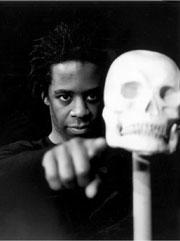WHEN ADRIAN LESTER shuffles on stage wishing that his “too, too solid flesh would melt,” your evening seems thrillingly full of possibility. He proceeds to do dizzying things with the language, to fly off into the gorgeous thick of it, knocking into its less familiar corners and kicking it around before throwing it back at you with a contemporary athleticism that somehow sounds like grace. He’s doing some breathless, delirious riff on the role, snapping his fingers, slapping his head, rushing over phrases and pulling back. It’s ecstatic jazz, and, like that music, brings personal immediacy to something already trusted and beautiful. Ohhhh, you think, This is gonna be good.
And for a while, actually, it is. Legendary director Peter Brook’s ballyhooed Hamlet opened in Seattle last week after we’d all been studiously alerted to the drastic cutting and rearranging of the text—it runs about two and half hours without intermission, and, yes, you’ll squirm a bit—and the reasons behind it. (The shorthand version: Brook wants to return some relevancy to the play and has excised anything that doesn’t directly deal with the plotline of the young prince’s revenge for his father’s murder). So, sure, you sit there realizing that soliloquies have different arrival times, and that, for instance, you won’t be seeing fussy old Polonious instruct his son Laertes to “neither a borrower nor a lender be,” but the absence doesn’t bother you. Yet.
Lester, in the meantime, is still riffing. The simple staging—an orange floor covered with pillows, a musician in the corner banging drums and clanging chimes—at first gives him room. His playfulness, under Brook’s still razor-sharp eye, doesn’t allow for smug familiarity. Before you can comment on the timelessness of it all, Lester and Brook have already leapt upon it and moved on.
The actor’s carte blanche virtuosity is such that others in the show tend to pale in comparison. Aside from Bruce Meyers, whose performance as both Polonious and the Grave Digger is a wondrous, revelatory jig, no other actor is really able to reach you. Round about the three-quarter mark, you realize that this is because you have little connection to anyone beyond the prince himself, and that the textual paring, while revitalizing the work, has left an agile Lester with less and less ground to dig his heels into. He can’t spread his passions out into the other people in Hamlet’s life because they just aren’t there.
I like a messy, dazed Ophelia, one who needs only that extra push from Hamlet to fall over the edge of sanity, but Brook keeps her a vision in white—Shantala Shivalingalippa can’t seem to communicate the “deject and wretched” creature who we must believe will later drown herself.
Laertes, too, is fairly drowned. Rohan Siva has passion in the role, but, as he doesn’t show up until Ophelia is around the bend, you’re never officially introduced to him or his relationship to his father and sister. Accordingly, his reaction to his sister’s madness (for me, always the most heartbreaking moment) holds no weight, and, neither does her death, his father’s death, nor, ultimately, his own.
By the evening’s end, a moving tableau that has Horatio (Scott Handy) repeating the opening’s “Who’s there?” over a pile of nondescript dead bodies, you can’t help but recognize how much more moving things would have been were we actually able to answer that question with a bit more certainty.








